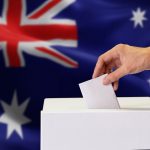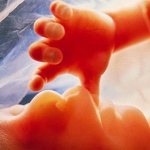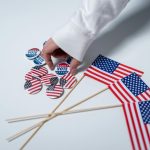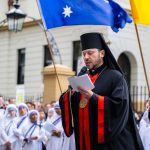Written by Kathy Clubb
While it has been very unsettling to watch the chain of events underway in the US due to the death of George Floyd, it has been no less disquieting to see Black Lives Matter protests mirrored in our own country. It is one thing to sympathise with the untimely death of an admittedly violent criminal. It is another thing entirely to see tens of thousands take to the streets, thousands of miles away, during a pandemic lockdown to protest “systemic racism”; a claim for which there is little evidence.
No matter what you might think about the risk posed by COVID-19, the contrast between tightly-controlled Church services and huge gatherings of free-roaming protesters couldn’t be more stark. Many took to social media to express their dismay at missing their grandmother’s funeral or their niece’s wedding while tens of thousands gather at close quarters to protest a perceived social injustice.
There is no doubt that racism does exist here in Australia on an individual level since we are a nation of human beings and human beings frequently fail in charity. But to suggest that Aboriginals are treated poorly here in a structural way is a complete lie since there is no other group that is so well-treated by the Church and welfare system, or so feted in the arts and by the media.
In fact, it is perhaps this skewed attention in favour of Aboriginals which is at the core of much of the racism that does exist. This is not to excuse racism, of course, but simply to point out that resentment is not a surprising reaction when witnessing how another group’s heritage allows them to sail through the welfare system or attract special scholarships and opportunities. It could even be said that being of Aboriginal or Torres Strait Islander descent gives you a leg up in Australia.
Crypto-Eugenics
It is not so long ago that racism was widely-accepted in this country, in the form of the Racial Hygiene movement. Like its counterparts in other countries, “racial hygiene” was nothing other than eugenics, aimed at eliminating races deemed to be inferior, as well as disabilities and hereditary illnesses.
The Racial Hygiene Association of New South Wales was formed in 1926 by Lillie Goodison[1], and revolved around the use of contraception to limit the number of sick and “inferior” babies born to Australian women. The Society proposed contraception as an alternative to abortion – which was known to threaten the lives of mothers – and opened Sydney’s first birth-control clinic in 1933.
In 1960, the Racial Hygiene Association became the Family Planning Association. While its focus appeared to have shifted from eugenics to the feminist ideal of empowerment, the Family Planning Association has lost none of its founder’s original intent: to reduce the populations of poorer, “weaker” communities, by expanding into the Oceania regions of the Solomon Islands, Papua New Guinea, Fiji, Timor-Leste, Vanuatu and other Pacific Island nations. In these communities, indigenous couples are targeted with intensive campaigns aimed at making them grateful, lifelong users of contraception.
In Australia itself, contraception campaigns aimed at Aboriginal women in remote communities have been enthusiastically taken up by indigenous health workers[2]. Under the guise of holistic health care, Aboriginal girls are introduced to Long-Acting Reversible Contraception (LARCs) at an early age. Hormonal contraceptive devices such as Implanon are promoted, even while acknowledging their many side-effects, and are popular because they can be inserted in the community setting. Girls are encouraged to delay pregnancy until they are old enough; little attention is paid to the fact that they are sexually active before this time.
In line with modern feminist practices, indigenous women are now encouraged to form ‘pregnancy intentions’[3], a practice which until recently was incompatible with their traditional belief that infertility was a source of shame and sadness.
Strangely, opposition to this “crypto-eugenics” as a form of systemic racism is never voiced by Black Lives Matter and its aligned activists.
Black deaths in custody
The grievance most commonly touted by Black Lives Matter protesters as evidence of systemic racism is the death of aboriginals in custody. While it is sadly true that there have been cases of such deaths, these numbers have been wildly inflated by BLM supporters. Indigenous academic, Dr Anthony Dillon, cites figures from 2015 which suggest that black prisoners are, in fact, less likely to die in custody than white Australians.[4] Dr Dillon also believes the “activists, social justice warriors, and their rent-a-crowds” are having only a negative, rather than beneficial, impact on our nation.
Contrary to the BLM activists’ narrative, after the 1991 Royal Commission into Black Deaths in Custody, police introduced a policy of providing extra care to Indigenous offenders, even to the point of weakening the justice system. Thus, Aboriginals who are taken into custody are routinely appointed lawyers, even if they do not request one, are housed apart from non-Indigenous prisoners, are checked more frequently, and are given, on average, shorter sentences than are non-Indigenous criminals.[5]
Not all indigenous Australians agree with BLM
However, among Australia’s indigenous commentators, there are some prominent voices who dissent from the black victimhood rhetoric.
One such voice belongs to artist Bindi Cole Chokka who was wildly successful both in Australia and internationally until she announced that she had become a Christian. The exhibits, interviews and commissions dried up almost overnight as one form of systemic discrimination which truly does exist in this country became increasingly evident; that is, the discrimination that exists against Christian conservatives.
Another high-profile commentator who doesn’t espouse racist victimhood is former ALP politician, Nyunngai Warren Mundine, who was honoured as an Officer of the Order of Australia in 2016. Nyunngai Mundine offers thoughtful and practical solutions to the obstacles facing indigenous people, beginning with the need for forgiveness for the ill-treatment of their ancestors during Australia’s colonisation by the British. Mundine suggests that indigenous people should be assisted in building strong economic bases rather than relying on welfare, and that education is an essential tool in allowing them to better integrate into modern Australian society.[6]
When interviewed about the recent Black Lives Matter protests, Mundine told 2GB that the marches were ‘irresponsible’:
“Here we are in a pandemic, people have lost their jobs, businesses have closed, you couldn’t go to a club, a pub.They are telling us to keep 1.5 metres away from each other and yet they organise this march. Every health officer, every medical officer, every doctor has said if the pandemic gets into the Aboriginal community it will be a disaster, because of our chronic health problems.”[7]
A third high-profile black commentator is Jacinta Nampijinpa Price. Jacinta is a Town Councillor in Alice Springs and is the daughter of Bess Price who was a Country Liberal Party member of the Northern Territory Parliament.
Jacinta Price was threatened with legal action when she exposed the tactics of Northern Territory ALP members during last year’s federal election. According to Price, illiterate Aboriginals were offered incentives, such as new vehicles, in return for influencing others to vote Labor. Vulnerable Aboriginals were also driven to the polling booths and supplied with ALP how-to-vote cards.[8]
Rather than focusing on black deaths in custody, Price is outspoken about the number of indigenous Australians who are being incarcerated for perpetrating acts of violence against their own community members; this includes many Aboriginal women who retaliate against the domestic violence which is widespread in remote communities.
Jacinta Price is scathing in her appraisal of the BLM protesters who, she says, are acting out of selfishness, and has stated that people don’t care about Indigenous deaths unless there’s a white perpetrator.[9] She lays the problem firmly at the feet of what she refers to as the racism ‘industry’: a government-dependent cash cow that exists solely to sustain itself without offering concrete solutions.
The true black victims
Jacinta Price correctly articulates the greatest injustice committed against Aboriginals in Australia: the child abuse, rape and domestic violence that take place within Aboriginal communities and which are perpetrated by Aboriginals. But there is little outcry about these problems from political activists.
The numbers involved are staggering, showing that systemic child abuse is not confined to Hollywood celebrities or elites like Jeffrey Epstein and his globalist clients. A 2019 enquiry[10] cited almost 23,000 child protection reports from the Northern Territory in that year alone, with over 2000 of those substantiated. These numbers are shocking for a state with a population of only 250,000.
One Aboriginal woman raises another problem: lack of parental oversight. Indigenous elder Mary Aiken lives in Western Australia’s Fitzroy Crossing and rejects the notion that police are discriminatory in their treatment of indigenous youth. “They try their hardest to help them and direct them,” she told The Australian.
“Parents up here, they allow the kids to roam the streets. I don’t see them heavy-handed in Fitzroy, The police are here trying to do their job and try to help the kids as well.”[11]
This lack of oversight by indigenous parents also extends to their children’s education. White Australians are often blamed for failing to provide equal opportunities for indigenous children to access a decent education. In reality, attendance at school by Aboriginal children is lower than that of other demographics, leading to the lower literacy and numeracy rates so often cited as proof of systemic racism.[12]
Until these serious problems are faced with honesty, movements like Black Lives Matter will continue to foment tension between indigenous and non-indigenous Australians, leaving the most vulnerable caught in a cycle of abuse. Aboriginal people deserve every support in being assisted to flourish but this will never happen while their grave problems are overlooked and while feminist practices, such as contraception, are imported into their traditional culture.









